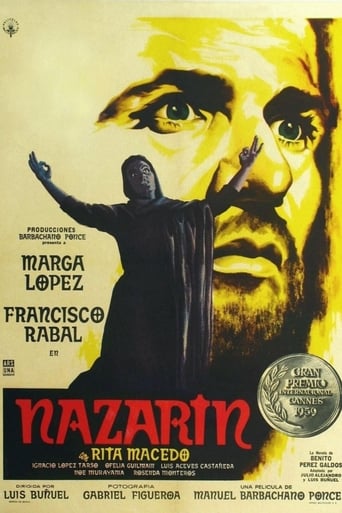Kirpianuscus
about faith as only manner to live. about the struggle to be Christian. all in the web of Bunuel's cruel and subtle irony. a remarkable film for the image of a way. for the crumbs from Don Quixote. for the science to explore social expectations and the self protection of many. grace full, courageous, cruel, cold, the same Bunuel who looking the decomposition of illusions. a man. and two woman. Mexican villages. the message. the sacrifice. and the shadow of doubt. it is more than a religious film. like each film of Bunuel, it represents perfect support for reflection. about life, people and faith's expressions. about ideal. and about its high price. nothing new, at the first sigh. but useful. for define yourself.
shu-fen
My third Buñuel movie so far, far much easier to understand than the French productions "Le Charme discret de la bourgeoisie" or "Belle de jour" where imagination and reality intercept each other in higher intervals… ah, my neurons keep dancing in whirpool while watching them, taxing anyway.After seeing it, the very first question burst out from my mouth was: International Catholic Cinema Office Award? It's a satire laughing at the ineffectiveness and cowardice of the Church and its discrimination and hostility towards women's validity and value to the Church (or God's Kingdom)! Father Nazario doesn't exist in our days on Earth... Why? Because he is Jesus. Jesus is now in heaven. No worker of God, in flesh and blood would or to be more exactly is able to behave, believe, think, act and live like he does. HOLY Nazario is a huge contrast to the hypocrisy of the Church (represented by his superior) who only focus onto the status and the trouble-free life.I like this movie, especially the very last scene. A village woman gives Father Nazario a fruit, encouraging him to go on. It's a confirmation from the mouth of simple and plain people to what he is doing regardless the hierarchy or the "canonized" or "orthodox" establishment, the Church... touching.
zetes
Luis Bunuel has always been a filmmaker whose work was obscure to me. My first experience with him was The Discreet Charm of the Bourgeosie, often considered his greatest work, with which I became so frustrated and bored that I eventually shut the tape off. Likewise Belle de Jour, which is almost certainly his best known film and also generally considered one of his many masterpieces, didn't interest me very much at all. I didn't hate it like I did Discreet, but I didn't like it. Third, I saw L'Age d'Or. Finally, I had gotten somewhere. Fourth, Los Olvidados, also good. Still, neither L'Age d'Or nor Los Olvidados blew me away. Great films, but not masterpieces.
Nazarin is my fifth Bunuel, and I like it just a tad more than those other two. It is about a priest from Spain now in Mexico who refuses to live in the kind of luxury most priests live in. He wants to be more like Jesus, leading the meekest life possible. He's also willing to forgive everyone for anything, and to suffer without protest. I'm pretty sure Bunuel does not sympathize with the character, and sees him as rather self-righteous. However, I only assume that because of my knowledge of the director, whose most famous quotation is "Thank God, I'm still an atheist," which he apparently said in an interview over this very film (I get this information from John Baxter's book about Bunuel, if you're interested). The interviewer who dragged those words from Bunuel's mouth must have been himself confused about Nazarin. One who was more predisposed to believe in religious conviction, who also knows nothing about Bunuel, might see the priest as a heroic figure. This is especially true if that viewer has his/her own criticisms of organized religion. The priest may be somewhat self-righteous, but he seems to be basically a good man. When he harbors a violent prostitute in his room in order to protect her (and, presumably, to save her soul), people begin to find out and assume that their relationship is sexual. His superiors assume the same and punish him for it. Later on, he suffers even worse punishments from clerics.
mifunesamurai
A priest attempts to live as close to the word of God but gets shafted for it by the peasants, the church and the authorities. Only a prostitute and a woman in search of love follow his steps. It has a powerful message but delivered in a tame way because of the politics of the time.


